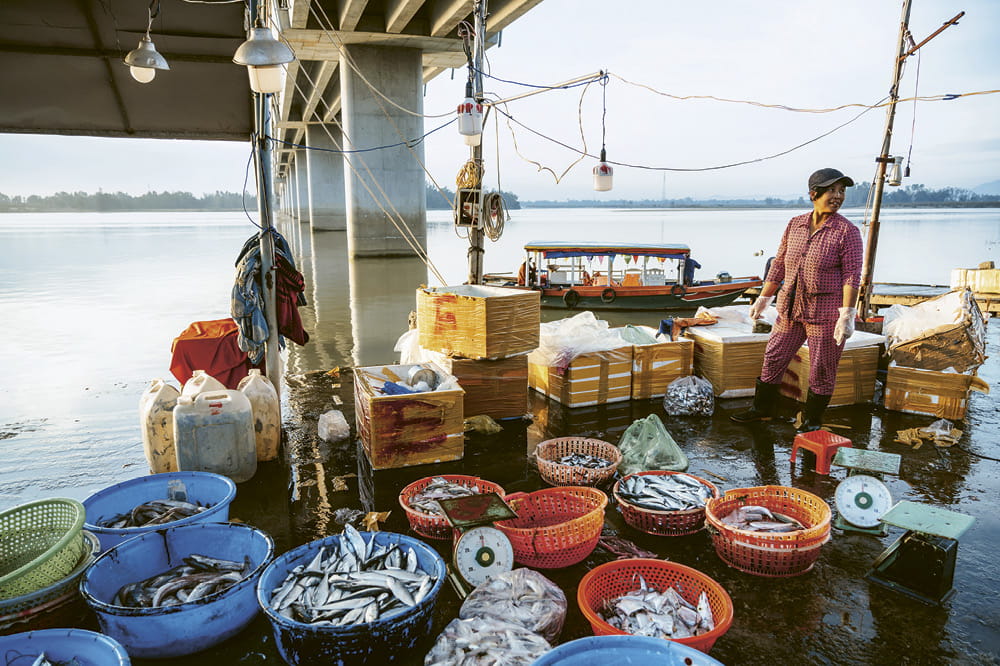Obtain news and background information about sealing technology, get in touch with innovative products – subscribe to the free e-mail newsletter.

04.12.2018 | Story
“Getting Out of Your Comfort Zone”
André Wiersig has set a goal: he wants to be the tenth person ever to swim the “Ocean’s Seven,” seven straits and channels around the world that are between 10 and 40 kilometers (6 to 25 miles) wide. Every year, he takes on a new one. He has just returned from one of his crossings in Japan, and he still has two left to do. A conversation about drive, self-determination and the different kinds of thirst, and what you can learn from the struggle against high waves, currents and sharks and apply to your professional life.
How do you look at thirst, Mr. Wiersig?
First, and foremost, it is a stimulus, a reminder to take care of certain things. There are needs that have to be met. But this immediately poses the question: would I like to eat something or am I really hungry? How strong is the stimulus, and how strong do I perceive it? I have swum through very cold water and I thought that I was cold. Today I don’t even consider similar temperatures to be cold. My sense of thirst is certainly no longer the same as it was eight years ago. I have moved to another level.
In other words, thirst, cold and hunger are relative?
Our ancestors probably knew real thirst. What we experience today is at most a hint of that feeling. Once, during the running portion of an Ironman competition, I was on the lookout for cows on because I was ready to drink out of their trough out of sheer thirst. We have everything in our lives. There’s always hot water and food. Not only that – it is precisely the food that I like the most. Everything is there. Even information is endlessly available. Today we are living in our comfort zone. The question is: what do we make of our lives?
You deliberately leave this comfort zone to travel around the world and swim across straits and channels that are thirty or forty kilometers wide.
Look, the sea is becoming a mere backdrop today. When people travel to the ocean, they swim in the hotel pool, not offshore. On your next vacation, head over to the beach and go into the water, and then swim straight out into the darkness. That’s how I start my crossings. I expose myself to nature. If you are out between the Hawaiian Islands, the water is extremely deep, the waves are high, and there are sharks, whales and poisonous jellyfish. You are completely in the hands of nature. I did have a boat accompanying me, but it couldn’t help me in an emergency. It couldn’t come too close due to the high waves. Otherwise, it would run me over.
You haven’t even mentioned the cold.
In the English Channel, the water temperature was around 13°C (55°F). Untrained people in bathing suits only survive that temperature for about an hour. In some cases, I was swimming for twelve hours at a stretch. It works – the body withstands it. But you have to prepare for it. I only took cold showers for three years – with no exceptions – with ice cold water from a rain barrel. That was an insane accomplishment, but any of us can basically do that.
What drives someone like you to suffer these tribulations?
The contrast to everyday life. I do have a job. I take the S-Bahn to the office. There are people everywhere. You can reach them at any time. On the other hand, everything outdoors has a pure character. A self-determining character. You feel nature, but you can’t compel nature to do anything. You can’t fight the waves. No matter how well I prepare myself, if the ocean doesn’t cooperate, I can’t swim against it. I love that part.
You can’t puton an act with a shark.
You love it? Why?
You completely become part of the ocean. You are a tiny speck being driven around. It is fantastic. You have to give yourself over to it.
And you have to give yourself over to sharks?
The sharks are there. It would be fatal and crazy for me to try and fool myself and say, “It will be fine. There aren’t any sharks here.” On the other hand, I can’t allow myself to be frightened if I run into one. I am a guest. This is his home. I am the intruder. I’ve already been stung by a Portuguese man of war, and I would not wish that pain on my worst enemy. It lasts an hour, then it slowly subsides.
In these situations, don’t you ever think about giving up?
You naturally think about giving up. That’s not really a bad thing. I don’t believe the people who say, “I’ll never give up!” You can question the situation, but, in the meantime, you carry on. And suddenly the thought of giving up becomes weaker and weaker. I’ve often decided to stop in a half-hour, and suddenly you are swimming another half hour, and then yet another. Then the sun comes out and you have banished the thought because it’s all already six or seven hours old and the coast is not far off. Dark feelings can consume you.
If you’re stung by a jellyfish, no one would blame you for giving up.
Sure, when the pain has practically robbed you of your senses. That’s when I consider whether I will break it off. But then I figure I’ll have the pain anyway even if I am just sitting in the boat. I might as well start swimming again. The body functions. Each of us is intended for entirely different things. At the training camp on Majorca, I sometimes swim into jellyfish deliberately. You learn to deal with the pain. That is also a triumph. It keeps you from panicking. I believe Portuguese men of war are only deadly when people panic and drown.
The most important rule in any life situation is to stay calm?
Yes. The same thing applies when you encounter sharks. The shark knows the situation. Everything flips out when it shows up. It is used to that. This arouses his hunter instinct. If I stay calm, it ignores me.
That frankly sounds as though it is easier said than done
You can’t put on an act with a shark. Either you are calm or you are not. That’s another lesson for everyday life. Today we all want to look cool, and technology gives us a way to do that. We are used to retouching our photos to improve them, so we can look better than we do in real life. But you can’t fool an animal. The shark senses this. I really see parallels in our working lives. We often run into extreme circumstances at work. There are so many things raining down on us, multiple, simultaneous challenges, that you cannot influence or can only influence in a limited way. The same thing applies in these cases: don’t panic. Raise questions – yes. But keep the goal in view.
VITA

A native of Paderborn, Wiersig competed in triathlons at a near-professional level during the 1990s and began participating again in 2002 after a break, parallel with a full-time job in IT and his family life. The idea to swim across seven ocean passages emerged from his experiences. Wiersig has also been lecturing at companies on goal attainment and personal character and is involved with environmental projects. He is currently looking for sponsors for the final two sea crossings.
If someone is thirsty for accomplishment, meaning that he wants to achieve something, does he need to have a concrete objective?
There are company goals in everyday life. These goals are prescribed for us. But there is a difference if I set the goal myself. People who make deliberate plans have a different posture. They have an impact on their entire environment. You feel the self-confidence. That is no different from what I do. Standing on the beach at night and then plunging into the water – that takes self-confidence.
Do you see lessons for everyday business life?
Certainly. I cannot directly influence the ocean and the wind. I can only have an impact on myself and my own attitude. It is exactly the same at work and in your personal life. The dissatisfaction that many people feel often stems from the fact that they personally feel responsible for so little. I tell people to stop playing the victim. If the waves are high, it doesn’t do any good to yell and scream that the ocean is to blame. There are factors that I cannot affect, and I have to be aware of the situation ahead of time.
In business, reaching goals often requires teamwork. Do you have a team?
Yes, though it is a small one. But every member of the team does what he does best. Everyone contributes based on his strengths. My brother-in-law, for example, is a very key person, namely the man in the boat. He is absolutely reliable and is never seasick. I know the degree to which I can rely on him. That is extremely important. I have to know exactly what every member of my team can do. But in the end, I swim alone. That is my role. I am responsible for that.
How do you deal with setbacks?
By accepting them. In Japan, the coast was within reach, but it took me six hours to cover the last four kilometers (2.5 miles) due to the current. Mind you, I was swimming at four kilometers per hour during this period, as I was on the previous stretch. You are swimming all out, but you aren’t making progress, and you have already been in the water for seven hours. In the end, it took me thirteen hours. There were others ahead of me that had more luck with the current and weather, and made it in seven hours. That’s just how it is.
How do other people react when you tell them that you swim across straits and channels in your free time?
Many are fascinated, but many can’t comprehend it. We human beings have a tendency to project things on ourselves. If I believe that I can’t do something myself, then I call it “crazy.” That’s a shame. Admittedly, when I travel to England on the ferry and look down into the water, I ask myself: You swam across this? How did you do that?
Let’s take a look at thirst in a concrete sense: You are surrounded by salt water, but you can’t drink it. How are you supplied?
I drink something every half hour. It includes nutrition. You can’t swim and chew at the same time. But I’m not allowed to touch the boat. My liquid nutrition is handed to me. You can’t let yourself drift due to the current, so you have to keep swimming. I adhere strictly to this rhythm. I don’t really have a choice since the boat has often moved away. Incidentally, you can’t take in all calories that you need. I have already experimented a great deal with this: a swim over these distances consumes more than 18,000 kilocalories. At the end, you are just tired. There is no feeling of exhilaration – the kind that marathoners feel at the finish line. You are really alone. You are relieved and happy, but on a different level. The feeling continues for months. It always lasts a long time.
Portuguese Man of War
This impressive marine animal with its extended, bluish “bell” and tentacles up to 50 meters in length can kill smaller fish with its poison. For humans, contact is extremely painful and leaves behind welts resembling whipping scars. The encounters occasionally end in death. The animal mainly lives in the Pacific Ocean, the Caribbean and the Canary Islands.
Doesn’t office work seem horribly banal afterwards?
No, I feel even better and more efficient. Refreshed. Perhaps like a computer that was shut down and then booted up again. It does you good to get back to normal. The two aspects around each other out. I don’t merely want to be part of the oceanic world. You don’t have any diversions when you are swimming. When I’m running or riding a bicycle, I see forests and the rest of nature. But you don’t see anything when you are swimming. Unless it is a shark that shows up a half-meter (1.6 feet) in front of you.
We keep hearing that our oceans are filling up with trash. Do you encounter some of it while you are swimming?
I once swam into a plastic tarp at night in the English Channel. That will give you the shock of your life. You don’t know what it is. If you are swimming around in your bathing suit, you are fully exposed to all of it. But you don’t really get the large garbage patches that you see in the media — and I run into micro plastics to a limited degree. There is much more lying beneath the surface. I have had the feeling for some time that I need to talk about all of it. I have to tell people how things really are. I am even trying to encourage children to swim in the ocean. It is really important for us to see the natural world around us.
What has to change?
The awareness. We have to be aware that this garbage comes from us and we have to take responsibility for what we have done. Not some president, not some government. All of us. We have to get away from thinking small or even in terms of nations. The sea knows no boundaries.
A major task.
A huge task! But people can start taking action themselves. Whether I’m on the beach gathering trash or if I buy an electric car. Above all, it is a matter of sending a signal, getting started and doing it. We have to change our thinking and our actions.
As you said earlier, setting goals for ourselves?
Yes. We are back at the beginning. I need self-confidence to set goals. If you succeed at doing what you personally have resolved to do, you have achieved a tremendous success. The first step is self-confidence. I can do what I have resolved to do. And then I prove it to myself. Many of us resolve to do something but never test ourselves.
But it doesn’t have to be an oceanic crossing, does it?
Oh no. I more often talk about trying out something new and getting out of your comfort zone – on your own. And not because your partner tells you to become more active physically.
When do the preparations begin for your next crossing?
They are already underway. I am going to be swimming off New Zealand during the Easter holidays in 2019. These waters are considered the stormiest strait in the world. There are huge waves and often a great many sharks, and box jellyfish. I would prefer not to be in the water longer than necessary.
Do you actually have time to see these countries while you are there?
You run into people off the beaten tourist paths. In Japan, I met fishermen who have lived in the area for generations. These people have an in-depth understanding of the local waters. The passage off the coast of Hawaii is, for example, the traditional route for a local canoe race. There have been people who went adrift and never came back. When these people see you’re going to swim across the passage, they have a reverential respect for you. I admit it gives me goosebumps.
More Stories About Food & Beverage

Join Us!
Experience Freudenberg Sealing Technologies, its products and service offerings in text and videos, network with colleagues and stakeholders, and make valuable business contacts.
Connect on LinkedIn! open_in_new














